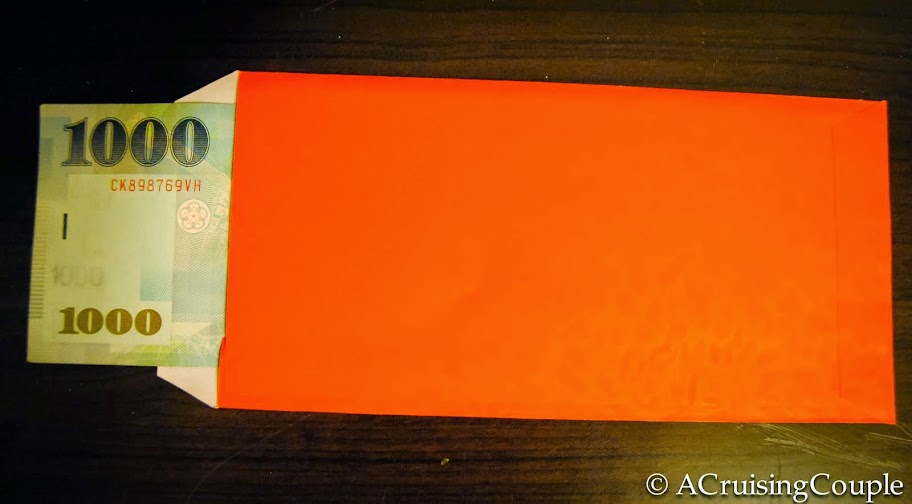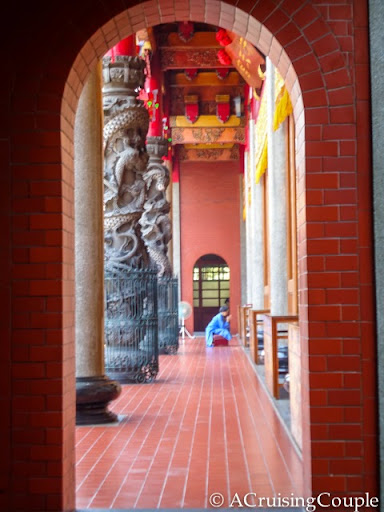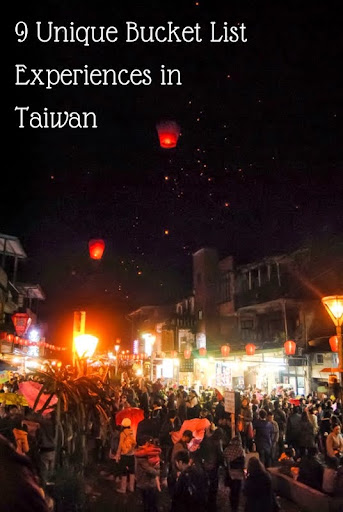Though we might have the best of intentions, it’s all too easy to commit cultural faux pas while abroad. I thought I knew what I was getting myself into before moving to Taiwan, but it wasn’t until I was living among and interacting with the locals that I started to become savvy about Taiwanese traditions and culture. As a result, I made a few blunders. Not all Taiwanese were bothered by my mistakes, but some were. I also witnessed other foreigners get into sticky situations when they didn’t realize the cultural blunders they had made. So learn from our mistakes and avoid the slip-ups below.
9 Cultural Faux Pas to Avoid in Taiwan
1. Writing someone’s name in red
The color red is considered lucky on most occasions in Taiwan. But when it comes to writing someone’s name, avoid the color at all costs. Many Taiwanese believe that seeing their name in red is a bad omen—it can even signify death. If you’re a teacher grading homework and tests in red ink, be especially careful. Most students won’t mind your mistake, but some parents and Taiwanese co-teachers will get very agitated.
2. Leaving chopsticks upright in a bowl of rice
Never stick your chopsticks straight down into your bowl of rice, as this resembles the look of incense offerings to the dead; it is highly disrespectful. This is also applicable to most countries that use chopsticks, especially Japan and China.

Friendly Taiwanese locals. Note: no chopsticks sticking up here.
3. Raising your voice in public
Don’t raise your voice or argue in public, particularly if it is with someone who is older or ‘above’ you (like management)—both are surefire ways to lose ‘face’. The importance of ‘face’ in Asia is similar to the concept of reputation in Western cultures, however a greater weight is placed upon maintaining ‘face’ at all costs. It refers to the whole of one’s identity, and extends into family relations and guanxi. Losing ‘face’ brings shame upon those closely tied to you, and it can be difficult to recover.

4. Attending a wedding without the proper gift
You won’t find any wedding registries in Taiwan. Rather, a typical wedding gift is money in a red envelope, which also serves as a contribution towards the wedding dinner expenses. The wedding receptionist will likely count the money in front of you and record the amount you gave. This isn’t to be rude, but rather to serve as a record. Don’t give less than US $60 as this is a sign that you don’t care about the wedding couple; also avoid giving any money in the amount of ‘4’, as this number symbolizes death in Chinese.

5. Attracting ghosts
Taiwanese are very superstitious. While you can attract as many ghosts as you please in your own time, try to avoid it when in the company of a local. Some great ways to attract ghosts include whistling at night, swimming in lakes or the ocean, and hanging your clothes outside overnight (ghosts may find your personals and then wear them, causing you to get sick). Many believe babies are especially prone to sighting the spirits, and never ever book a dirty hotel— that’s where ghosts roam free.

6. Eating the food on tables at the temples
Temples are lively places, and it is acceptable for foreigners to wander around the complex, taking in the scenes and even snapping pictures. Don’t be afraid to pick up some incense or fortune-telling blocks yourself to understand further the daily life that revolves around temple visits. Just don’t eat the food on the tables—they are offerings. You might think this is a bit obvious, but I’ve seen it done before…

Don't eat these offerings at a temple
7. Slacking off
The Taiwanese work extremely hard. It often starts when they are as young as three and sent to bilingual kindergartens; it continues through grade school with extracurricular classes most nights of the week and even Saturday mornings; it is concreted as adults when those same hardworking students begin to work ten-hour days, six days a week. Work ethic is important, partially stemming from the idea that the company is an extension of your family. Management receives the utmost respect, and often decisions made by those in positions above you are not questioned, regardless of whether they make sense to you. If you’re a foreigner working in Taiwan, you’ll often be expected to put in a large amount of effort in the workplace as well. Your Taiwanese co-workers might not understand why you are opposed to putting in extra work without the extra pay.
8. Giving and receiving things with one hand
Whenever you are giving or receiving something, such as change at the supermarket, a business card or a gift, you should do so with two hands. This is a sign of respect, and it shows that you are interested in the person you are exchanging with. This is especially applicable when exchanging business cards. Often when you meet a Taiwanese person for the first time, they will give you their business card, even if it is unlikely you will ever need to do business with them. You should always accept the card with two hands and then look over it carefully before putting it in your wallet.

9. Wearing your shoes inside
This is a typical custom of Asian, Middle Eastern, Indian and even some African households; Taiwan is no different. If you are ever invited to the home of a Taiwanese person, be sure to take your shoes off at the door. On an obvious level, this avoids tracking dirt into the house. It also might have something to do with Chinese foot reflexology, and the idea that the pressure points on your feet are simulated with contact on the ground.
The Taiwanese are some of the friendliest people in the world; even if you commit a blunder or two from above, they are still likely take you in and help you in any way that they can. Don’t be afraid to mingle with the gracious Taiwanese—after all, a local friend is the best way to become savvy with cultural traditions!

MORE Taiwan travel goodness:
A guide to visiting Taiwan’s biggest attraction: Taroko Gorge
9 Unique Bucket List Experiences in Taiwan

5 Reasons to Take a Road Trip on Taiwan’s Northeast Coast
Beehive Fireworks Festival: Taiwan’s Most Dangerous Event
Burning Boat Festival: An Encounter with Traditional Taiwanese Folklore
The 7 Natural Wonders of Taiwan
Taiwanese Night Market Culture: Eat, Drink, and Be Daring
Casey Siemasko, the Taiwan Editor for Wandering Educators, is a freelance writer, blogger, and avid traveler. She finds her life inspiration by exploring new places and meeting new people, and seeks to find magic in the most ordinary of places. When she's off the computer, she enjoys practicing yoga, training for marathons and scuba diving. Somewhere in there she also found time to write an eBook, 101 Tips to Living in Taiwan.
All photos courtesy and copyright Casey Siemasko except word photo: creative commons



